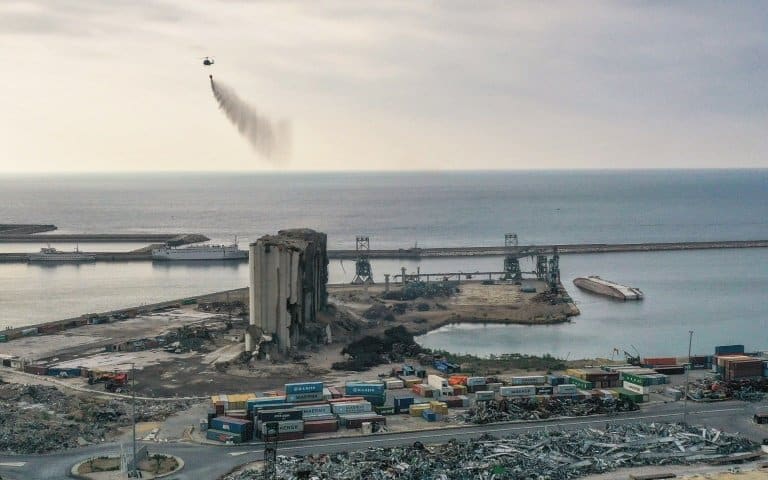Beirut’s blast-damaged grain silos partially collapse

Parts of Beirut’s grain silos collapsed on Sunday, just days before the second anniversary of a catastrophic explosion at the Lebanese capital’s port that ravaged the stores and swathes of the city.
AFP correspondents said a cloud of dust covered the port after the partial collapse of the silos, where a fire has been burning for more than two weeks.
Army helicopters doused the area with water to try to put out the blaze.
The silos complex had absorbed much of the impact of the August 4, 2020 mega-blast at the port that killed more than 200 people and injured over 6,500.
The silos shielded much of the city’s west from the devastating effects of the blast, which was caused by haphazardly stored ammonium nitrate fertiliser catching fire.

The heavily damaged grain silos at Beirut port following a partial collapse on Sunday / © AFP
Sunday’s partial collapse came after fire broke out at the silos earlier this month, caused by fermentation of remaining grain stocks along with soaring summer temperatures, according to authorities.
Lebanon’s caretaker prime minister this week warned they could fall.
“The northern group of silos are now in danger of falling,” Najib Mikati said Wednesday in a statement, which added that the silos still contained thousands of tonnes of wheat and corn.
He told the army to be prepared and warned workers, civil defence members and firefighters to keep a safe distance from the site.
Once boasting a capacity of more than 100,000 tonnes, an imposing 48-metre (157-foot) high remnant of the silos has become emblematic of the catastrophic port blast.
The government in April ordered their demolition due to safety concerns, but that move was suspended amid objections, including from relatives of blast victims who want the silos preserved as a memorial site.
“I cried when I learned that they collapsed,” Cecile Roukoz, who lost her brother in the explosion, told AFP.
“We want a part of them to stay as a witness to the crime, as a collective memory to the city, and in memory of those who lost their lives for no reason.”
The Lebanese investigation into the blast has faced systematic and blatant political obstruction from day one.
Authorities were unable to unload around 3,000 tonnes of wheat and corn stuck in the silos because doing so might accelerate their collapse, this week’s statement said.
The environment and health ministries had advised the public to evacuate the port area and use masks in the vicinity of the silos in case they collapsed.





